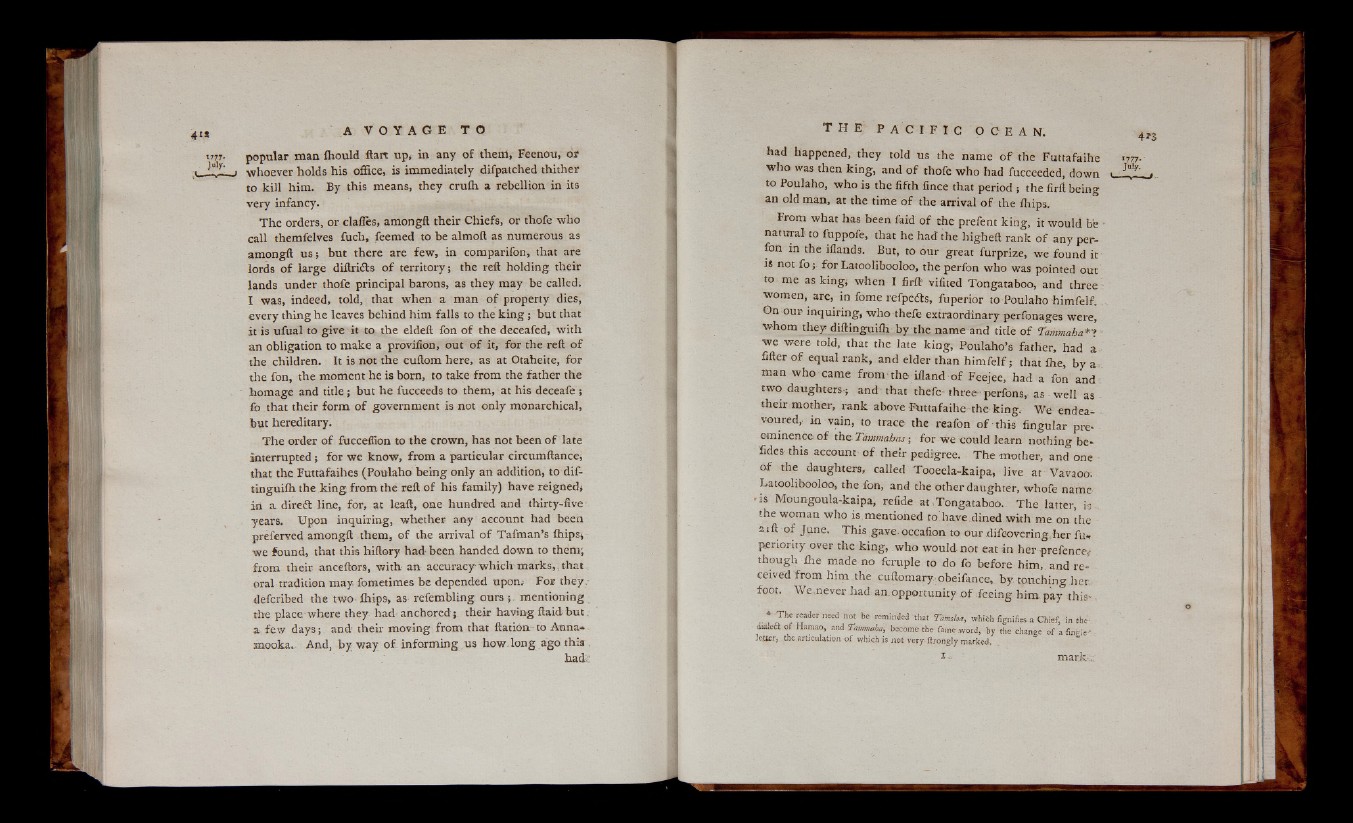
1777. popular man ihould ftart up, in any of them, Feenou, or
J“_ . whoever holds his office, is immediately difpatched thither
to kill him. By this means, they cruih a rebellion in its
very infancy.
The orders, or claflès, amongft their Chiefs, or thofe who
call themfelves fuch, feemed to be almoft as numerous as
amongft us ; but there are few, in companion, that are
lords of large diftridls of territory ; the reft holding their
lands under thofe principal barons, as they may be called,
I was, indeed, told, that when a man of property dies,
every thing he leaves behind him falls to the king ; but that
it is ufual to give it to, the eldeft fon of the deceafed, with
an obligation to make a provifion, out o f it, for the reft of
the children. It is not the cuftom here, as at Otaheite, for
the fon, the moment he is born, to take from the father the
homage and title; but he fucceeds to them, at his deceafe ;
£0 that their form of government is not only monarchical,
but hereditary.
The order of fueceffion to the crown, has not been of late
interrupted ; for we know, from a particular circumftance,
that the Futtafaihes (Poulaho being only an addition, to dif-
tinguiih the king from the reft of his family) have reigned;
in a. direft line, for, at leaft, one hundred and thirty-five-
years. Upon inquiring, whether any account had been
preferved amongft them, of the arrival of Tafman’s ihips,
we found, that this hiftory had- been handed down to them;
from their anceftors, with an accuracy which marks,, that
oral tradition may fometimes be depended upon; For they ,
defcribed the two ihips, as refembling ours mentioning ;
the place where they had anchored;, their having ftaidbut
a few days ; and- their moving from that ftation- to Anna*
mooka. And, by way of. informing us how, long ago this ,
hatfe
had happened, they told us the name o f the Futtafaihe >777.
Who was then king, and of thofe who had fueceeded, down ■ J“‘y'
to Poulaho, who is the fifth fince that period ; the firft being
an old man, at the time of the arrival o f the ihips.
From what has been laid of the prefent king, it would b'e ■
natural to fuppofe, that he had the higheft rank of any per-
fon in the illands. But, to our great furprize, we found it
is not, fo;. for Latoolibooloo, theperfon who was pointed out
to me as king; when I firft vifited Tongataboo, and three
women, are, in fome refpedts, fuperior to Poulaho himfelf...
On our inquiring, who thefe extraordinary perfonages were,
whom they diftinguifli by the name and title of Tammaha*?
we were told, that the late king, Poulaho’s father, had a
fitter of equal rank, and elder than himfelf; that ihe, by a
man who came from the iiland of Feejee, had a fon and
two daughters-; and that thefe- three-perfons,. as - well as -
their mother, rank above-Futtafaihe-the king. We endeavoured,
in vain, to trace the reafon of this fingular pre*
eminence of the Tammahns; for we could learn nothing be-
Tides this account of their pedigree. The mother, and one
of the daughters, called Tooeela-kaipa, live at Vavaoo;
Latoolibooloo, the fon, and the other daughter, wliofe name
•is Moungoula-kaipa, refide at .Tongataboo. The latter, is,,
the woman who is mentioned to have dined with me on the
21ft of June. This gave, occafion to our difeovering.her fu*
periority over the king, who would not eat in her prefence,•
though ihe made no fcruple to do To before him, and received
from him the cuftomary obeifance, by touching her,
foot. We-never had an. opportunity of Teeing him pay this-,
* -The reader need hot be reminded that Tirnloa, whit* dignifies a Chief, in the-
diaieft of Hamao, and Tammaba, become the fame .word, by the change of a fingie> •
Je&er9 the .articulation of which is not very, ftrongly marked,
11 ' : marki